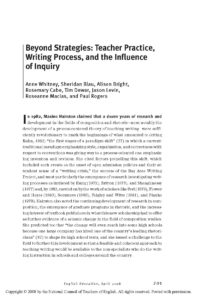Author: Anne Whitney, Sheridan Blau, Alison Bright, Rosemary Cabe, Tim Dewar, Jason Levin, Roseanne Macias, and Paul Rogers
Summary: A key reading, this award-winning research study may serve equally well as the focus for a group studying writing process pedagogy or for teacher leaders developing and leading a professional development program. Based on two contrasting case studies, the overall study provided evidence for the importance of inquiry in transforming teaching practice and student performance. While each teacher discusses how she interpreted and implemented a process-centered theory of writing, the comparative data suggest that inquiry-based inservice may lead to more nuanced thinking about teaching writing and increase a teacher’s sense of responsibility for improving curricula and interrogating her own practice. The study also includes detailed descriptions of the inquiry-based professional development in which one of the teachers participated.
Original Date of Publication: April 2008
Excerpt
The differences in how teachers approach samples, topics, and prewriting are important in that they help to frame writing tasks as governed by communicative needs rather than classroom needs. In classrooms such as Ms. Barrera’s, rhetorical situations presented themselves much as they do in the world outside the classroom, and it was up to students (with the teacher’s support) to navigate those situations by developing ideas, choosing tools for invention and planning, and making all of the other decisions writers must make. In Ms. Gonzales’ classroom, writing was usually framed as necessary for school assignments more than for communication, and tools and support were made available to assist students in meeting the requirements of these school assignments.
Related Resources
- Getting Inside Inquiry: Teachers’ Questions Transform Their Practice
- Narrative Knowers, Expository Knowledge: Discourse as Dialectic
- A Cognitive Strategies Approach to Reading and Writing Instruction for English Language Learners in Secondary School
Copyright © 2008 by the National Council of Teachers of English. Posted with permission.
Whitney, Anne, Sheridan Blau, Alison Bright, Rosemary Cabe, Tim Dewar, Jason Levin, Roseanne Macias, and Paul Rogers. 2008. “Beyond Strategies: Teacher Practice, Writing Process, and the Influence of Inquiry.” English Education 40 (3): 201–230.
Original Source: National Writing Project, http://www.nwp.org/cs/public/print/resource/2781
